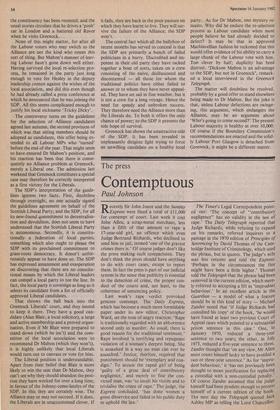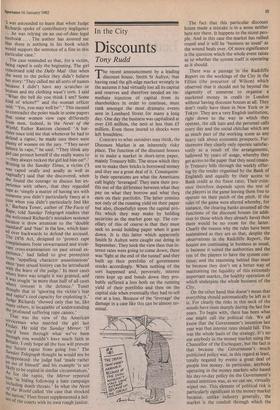The press
Contemptuous
Paul Johnson
Recently Sir John Junor and the Sunday Express were fined a total of £11,000 for contempt of court. Last week it cost John Allen, a scrap-metal merchant, less than a fifth of that amount to rape a 17-year-old girl, an offence which even Judge Bertrand Richards, who declined to send him to jail, termed 'one of the gravest crimes there is.' Of course judges don't like the press making such comparisons. They don't think the press should have anything to do with court cases, except to report them. In fact the press is part of our judicial system in the sense that publicity is essential to the detection of crime, the proper con- duct of the courts and, not least, to the coherence of sentencing policy.
Last week's rape verdict provoked genuine contempt. The Daily Express, which has become a much more formidable paper under its new editor, Christopher Ward, set the tone of angry reaction: 'Rape is traditionally regarded with an abhorrence second only to murder. As usual, there is good reason for the traditional sentiment.' Rape involved 'a terrifying and repugnant violation of a woman's deepest being. She is assaulted in a way no man can ever be assaulted.' Justice, therfore, required that punishment should be 'exemplary and con- dign.' To accuse the raped girl of being 'guilty of a great deal of contributory negligence,' and merely to fine the con- victed man, was `to insult his victim and to trivialise the crime of rape.' The judge, the Express concluded, `has done women a gross disservice and failed in his public duty to uphold the law.' The Times's Legal Correspondent point- ed out: 'The concept of "contributory negligence" has no validity in the law of rape.' The Daily Telegraph reported that Judge Richards, while refusing to expand on his remarks, referred inquirers to a passage in the 1970 edition of Principles of Sentencing by David Thomas of the Cam- bridge Institute of Criminology, which used the phrase, but in quotes. The judge's wife was less reticent and told the Express: 'Perhaps in the circumstances the fine might have been a little higher.' Thomas told the Telegraph that the phrase had been removed in the current edition, which mere- ly referred to accepting a lift as 'imprudent behaviour.' In an excellent article in the Guardian — a model of what a feature should be in this kind of story — Michael Zander noted that 'if Judge Richards had consulted his copy' of the book, 'he would have found at least two previous Court of Appeal cases which pointed to a substantial prison sentence in this case.' One, in January 1970, reduced a three-yeas sentence to two years; the other, in July 1973, reduced a five-year sentence to three. Zander thought that 'on any view, Mr Allen must count himself lucky to have avoided a two or three-year sentence.' As for 'impru- dent behaviour,' it 'has not previously been thought to mean justification for replacing a custodial with a non-custodial penalty. Of course Zander assumed that the judge himself had been prudent enough to possess himself of a current edition of the book. The next day the Telegraph quoted Jack Ashley MP as telling the Lord Chancellor:
was astounded to learn that when Judge Richards spoke of contributory negligence • . .he was relying on an out-of-date legal textbook . . . The author has assured me that there is nothing in his book which would support the sentence of a fine in this Particular case.'
The case reminded us that, for a victim, being raped is only the beginning. The girl concerned told the Daily Mail that when she went to the police they didn't believe her story: `They called me all sorts of names because I didn't have any scratches or bruises and my clothing wasn't torn. I said "What the hell do you think I am? Some kind of whore?" and the woman officer said: "Yes, you may well be".' This seemed to contradict the point made in some papers that some women view rape differently from men. Indeed, in the News of the World, Esther Rantzen claimed: 'A bar- rister once told me that whenever he had to defend a rapist, he made sure there were Plenty of women on the jury. "They never believe in rape," he said. "They think any girl can protect herself if she really wants to they always reckon the girl led him on".' Writing in the Sunday Times, a victim ('I was raped orally and anally as well as vaginally') said that she discovered, when she found the courage to discuss her tx- Perience with others, that they regarded rape as `simply a matter of having sex with someone you didn't particularly fancy at a time when you didn't particularly feel like it' Barbara Toner, author of The Facts of Rape, told Sunday Telegraph readers that she welcomed Richards's mistaken sentence because it drew attention to the 'double standard' and 'bias' in the law, which lean- ed over backwards to defend the accused. The 1976 Act, designed to 'protect rape complainants from unwarranted and irrele- vant cross-examination on past sexual ex- perience,' had failed to give protection 4.r°111 'appalling character assassinations' since 'past sexual history can be introduced with the leave of the judge.' In most cases Where leave was sought it was granted, and It was sought 'in more than half of all cases where consent is the defence.' Toner thought that in `ignoring the victim's fear and rapist's cool capacity for exploiting it.' Judge Richards 'showed only that he, like many others, is incapable of understanding the Profound suffering rape causes.' That was the view of the American serviceman who married the girl last ,,rlday. He told the Sunday Mirror: If you'd been through what we've been througou wouldn't have uch faith in Britain.h Iy only hope all the fusms will prevent any future rapist from going free.' The d.undaY Telegraph thought he would not be Isappointed: the judge had `made rather ar,n ass of himself' and his example 'is not to be copied in similar circumstances.' As for the rapist, the Mirror reported urn 'in hiding following a hate campaign including death threats.' In what the News the the World called 'the case that shocked , nation,' Fleet Street supplemented a fail- ure of the courts with its own rough justice.



































 Previous page
Previous page